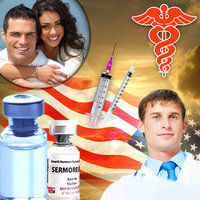Introduction to Primary Hypogonadism
Primary hypogonadism, also known as testicular failure, is a medical condition where the testes fail to produce adequate levels of testosterone, the primary male sex hormone, and/or a sufficient number of sperm. This condition can lead to a myriad of health issues, including decreased libido, infertility, muscle loss, and increased risk of osteoporosis. Despite its significant impact on men's health, primary hypogonadism remains underdiagnosed and undertreated, particularly among American males.
The Prevalence and Impact of Primary Hypogonadism
In the United States, primary hypogonadism affects approximately 1 in 200 men, though the actual numbers may be higher due to underdiagnosis. The condition can manifest at any age, from congenital cases to those acquired later in life due to factors such as injury, infection, or chemotherapy. The repercussions of untreated primary hypogonadism extend beyond physical health, often leading to psychological issues such as depression and diminished quality of life.
Symptoms and Diagnosis
Recognizing the symptoms of primary hypogonadism is crucial for early intervention. Common signs include decreased sexual desire, erectile dysfunction, fatigue, and loss of body and facial hair. Diagnosis typically involves a thorough medical history, physical examination, and blood tests to measure testosterone levels and gonadotropins (FSH and LH). Additional tests, such as semen analysis and genetic testing, may be necessary to pinpoint the underlying cause.
Treatment Options and Management
The cornerstone of treatment for primary hypogonadism is testosterone replacement therapy (TRT), which can be administered via injections, gels, patches, or pellets. TRT can significantly improve symptoms and quality of life, but it is not without potential side effects, such as acne, sleep apnea, and an increased risk of prostate issues. Therefore, regular monitoring by a healthcare provider is essential. For men desiring fertility, additional treatments such as gonadotropin therapy may be considered.
The Need for Increased Awareness
Despite the availability of effective treatments, many American men remain unaware of primary hypogonadism and its implications. This lack of awareness leads to delayed diagnosis and treatment, exacerbating the condition's impact on health and well-being. Healthcare providers play a pivotal role in educating patients about the symptoms and the importance of seeking medical advice if they suspect they might be affected.
Strategies to Enhance Awareness
To address this gap, a multi-faceted approach is necessary. Public health campaigns can help disseminate information about primary hypogonadism, emphasizing the importance of early detection and treatment. Collaboration between healthcare professionals and patient advocacy groups can further enhance awareness and support. Additionally, incorporating routine screening for hypogonadism in annual health check-ups for men could facilitate earlier diagnosis.
The Role of Support Networks
Support networks and patient advocacy groups are invaluable resources for men living with primary hypogonadism. These organizations provide a platform for sharing experiences, accessing educational materials, and connecting with others facing similar challenges. By fostering a sense of community and empowerment, these groups can significantly improve the lives of those affected.
Conclusion: A Call to Action
Primary hypogonadism is a serious yet often overlooked condition that requires greater attention and action from both the medical community and the public. By increasing awareness, improving education, and promoting early diagnosis and treatment, we can enhance the health and well-being of American males affected by this condition. It is time to lift the veil on primary hypogonadism and ensure that no man suffers in silence.
Contact Us For A Fast And Professional Response

- Primary Hypogonadism in American Males: Overcoming Stigma and Enhancing Treatment [Last Updated On: March 15th, 2025] [Originally Added On: March 15th, 2025]
- Primary Hypogonadism in Aging Men: Symptoms, Diagnosis, and Treatment Options [Last Updated On: March 17th, 2025] [Originally Added On: March 17th, 2025]
- Managing Primary Hypogonadism and Diabetes: Challenges and Strategies for American Men [Last Updated On: March 18th, 2025] [Originally Added On: March 18th, 2025]
- Primary Hypogonadism and Obesity Link: Impact and Management in American Men [Last Updated On: March 18th, 2025] [Originally Added On: March 18th, 2025]
- Primary Hypogonadism: Symptoms, Diagnosis, and Advocacy for American Men's Health [Last Updated On: March 18th, 2025] [Originally Added On: March 18th, 2025]
- Managing Primary Hypogonadism: Nutritional Strategies to Boost Testosterone in American Males [Last Updated On: March 19th, 2025] [Originally Added On: March 19th, 2025]
- Exercise Strategies for Managing Primary Hypogonadism in American Males [Last Updated On: March 19th, 2025] [Originally Added On: March 19th, 2025]
- Primary Hypogonadism: Impact, Diagnosis, and Management Strategies for American Men [Last Updated On: March 19th, 2025] [Originally Added On: March 19th, 2025]
- Primary Hypogonadism: Support Networks Crucial for Emotional and Treatment Guidance [Last Updated On: March 19th, 2025] [Originally Added On: March 19th, 2025]
- Innovative Therapies Transforming Primary Hypogonadism Treatment in American Males [Last Updated On: March 20th, 2025] [Originally Added On: March 20th, 2025]
- Primary Hypogonadism and Sleep: Impacts and Management Strategies for American Men [Last Updated On: March 20th, 2025] [Originally Added On: March 20th, 2025]
- Primary Hypogonadism in American Males: Current Treatments and Future Innovations [Last Updated On: March 21st, 2025] [Originally Added On: March 21st, 2025]
- Managing Primary Hypogonadism: Importance of Regular Check-ups for American Males [Last Updated On: March 21st, 2025] [Originally Added On: March 21st, 2025]
- Navigating the Emotional Journey of Primary Hypogonadism in American Males [Last Updated On: March 22nd, 2025] [Originally Added On: March 22nd, 2025]
- Navigating Primary Hypogonadism: Diagnosis, Treatment, and Healthcare Advocacy in the U.S. [Last Updated On: March 22nd, 2025] [Originally Added On: March 22nd, 2025]
- Primary Hypogonadism: Impact on Work and Strategies for Productivity in American Men [Last Updated On: March 22nd, 2025] [Originally Added On: March 22nd, 2025]
- American Males' Resilience and Strength with Primary Hypogonadism: Personal Stories and Support [Last Updated On: March 23rd, 2025] [Originally Added On: March 23rd, 2025]
- Primary Hypogonadism: Causes, Symptoms, and Treatment for American Men's Health [Last Updated On: March 23rd, 2025] [Originally Added On: March 23rd, 2025]
- Primary Hypogonadism's Impact on Muscle Mass in American Males: Mechanisms and Interventions [Last Updated On: March 23rd, 2025] [Originally Added On: March 23rd, 2025]
- Primary Hypogonadism: Symptoms, Diagnosis, and Management in American Men [Last Updated On: March 23rd, 2025] [Originally Added On: March 23rd, 2025]
- Primary Hypogonadism in American Men: Causes, Diagnosis, and Holistic Management Strategies [Last Updated On: March 24th, 2025] [Originally Added On: March 24th, 2025]
- Primary Hypogonadism: Impact on American Men's Social Life and Well-being [Last Updated On: March 24th, 2025] [Originally Added On: March 24th, 2025]
- Primary Hypogonadism in American Males: Causes, Impacts, and Management Strategies [Last Updated On: March 24th, 2025] [Originally Added On: March 24th, 2025]
- Primary Hypogonadism: Causes, Symptoms, and Treatment Options for American Men [Last Updated On: March 24th, 2025] [Originally Added On: March 24th, 2025]
- Primary Hypogonadism: Diagnosis, Impact, and Management in American Men [Last Updated On: March 24th, 2025] [Originally Added On: March 24th, 2025]
- Managing Primary Hypogonadism: Testosterone Therapy and Lifestyle Strategies for American Men [Last Updated On: March 24th, 2025] [Originally Added On: March 24th, 2025]
- Managing Primary Hypogonadism: Education, Treatment, and Support for American Males [Last Updated On: March 24th, 2025] [Originally Added On: March 24th, 2025]
- Primary Hypogonadism: Impacts on Body Image and Holistic Management Strategies [Last Updated On: March 24th, 2025] [Originally Added On: March 24th, 2025]
- Primary Hypogonadism in American Males: The Vital Role of Family Support [Last Updated On: March 25th, 2025] [Originally Added On: March 25th, 2025]
- Community Support Enhances Life for Men with Primary Hypogonadism [Last Updated On: March 25th, 2025] [Originally Added On: March 25th, 2025]
- Primary Hypogonadism's Emotional Impact on American Males: Diagnosis, Treatment, and Support [Last Updated On: March 25th, 2025] [Originally Added On: March 25th, 2025]
- Genetic Testing for Primary Hypogonadism: Diagnosis and Management in American Males [Last Updated On: March 25th, 2025] [Originally Added On: March 25th, 2025]
- Primary Hypogonadism's Impact on Physical Activity in American Males [Last Updated On: March 25th, 2025] [Originally Added On: March 25th, 2025]
- Economic Impact of Primary Hypogonadism on American Men: Costs and Management Strategies [Last Updated On: March 26th, 2025] [Originally Added On: March 26th, 2025]
- Primary Hypogonadism: Advocacy and Research Needs for American Men's Health [Last Updated On: March 26th, 2025] [Originally Added On: March 26th, 2025]
- Primary Hypogonadism's Impact on Self-Esteem in American Males: Awareness and Treatment [Last Updated On: March 26th, 2025] [Originally Added On: March 26th, 2025]
- Nutritionists' Vital Role in Managing Primary Hypogonadism in American Males [Last Updated On: March 26th, 2025] [Originally Added On: March 26th, 2025]
- Primary Hypogonadism: Symptoms, Early Intervention, and Treatment Options for American Men [Last Updated On: March 26th, 2025] [Originally Added On: March 26th, 2025]
- Primary Hypogonadism in American Men: The Vital Role of Peer Support [Last Updated On: March 26th, 2025] [Originally Added On: March 26th, 2025]
- Primary Hypogonadism: Symptoms, Diagnosis, and Management in the U.S. Healthcare System [Last Updated On: March 26th, 2025] [Originally Added On: March 26th, 2025]
- Primary Hypogonadism: Diagnosis, Specialists, and Treatment for American Men [Last Updated On: March 27th, 2025] [Originally Added On: March 27th, 2025]
- Diagnosing Primary Hypogonadism in American Males: Challenges and Solutions [Last Updated On: March 27th, 2025] [Originally Added On: March 27th, 2025]
- Primary Hypogonadism: Impacts on American Males' Careers and Strategies for Resilience [Last Updated On: March 27th, 2025] [Originally Added On: March 27th, 2025]
- Primary Hypogonadism in American Males: Symptoms, Effects, and Management Strategies [Last Updated On: March 27th, 2025] [Originally Added On: March 27th, 2025]
- Managing Primary Hypogonadism in American Men: Diagnosis, Treatment, and Lifestyle Strategies [Last Updated On: March 27th, 2025] [Originally Added On: March 27th, 2025]
- Primary Hypogonadism: Understanding Treatments and Managing Side Effects in American Males [Last Updated On: March 27th, 2025] [Originally Added On: March 27th, 2025]
- Primary Hypogonadism: Impact on Mental Health and Role of Professionals [Last Updated On: March 27th, 2025] [Originally Added On: March 27th, 2025]
- Primary Hypogonadism in American Men: Prevalence, Management, and Future Research [Last Updated On: March 28th, 2025] [Originally Added On: March 28th, 2025]
- Primary Hypogonadism: Emotional Support Strategies for American Men [Last Updated On: March 29th, 2025] [Originally Added On: March 29th, 2025]
- Primary Hypogonadism: Challenges and Solutions in Male Family Planning [Last Updated On: March 30th, 2025] [Originally Added On: March 30th, 2025]
- Exercise Physiologists' Role in Managing Primary Hypogonadism in American Males [Last Updated On: March 30th, 2025] [Originally Added On: March 30th, 2025]
- Managing Primary Hypogonadism: Lifestyle Strategies for American Men's Health [Last Updated On: April 2nd, 2025] [Originally Added On: April 2nd, 2025]
- Managing Primary Hypogonadism: Strategies for Stress and Anxiety in American Men [Last Updated On: April 2nd, 2025] [Originally Added On: April 2nd, 2025]
- Endocrinologists' Vital Role in Managing Primary Hypogonadism in American Males [Last Updated On: April 3rd, 2025] [Originally Added On: April 3rd, 2025]
- Overcoming Psychological Barriers to Primary Hypogonadism Treatment in American Males [Last Updated On: April 3rd, 2025] [Originally Added On: April 3rd, 2025]
- Managing Primary Hypogonadism: Financial Assistance Options for American Men [Last Updated On: April 6th, 2025] [Originally Added On: April 6th, 2025]
- Primary Hypogonadism: Impacts on Social Connections and Strategies for Support [Last Updated On: April 8th, 2025] [Originally Added On: April 8th, 2025]
- Managing Primary Hypogonadism: Education's Role in American Males' Health [Last Updated On: April 9th, 2025] [Originally Added On: April 9th, 2025]
- Support Groups: Vital for American Males with Primary Hypogonadism [Last Updated On: April 9th, 2025] [Originally Added On: April 9th, 2025]
- Managing Primary Hypogonadism in American Men: A Multidisciplinary Approach [Last Updated On: April 9th, 2025] [Originally Added On: April 9th, 2025]
- Managing Primary Hypogonadism: Symptoms, Diagnosis, and Treatment for American Men [Last Updated On: April 9th, 2025] [Originally Added On: April 9th, 2025]
- Technology Revolutionizes Primary Hypogonadism Management in American Men [Last Updated On: April 10th, 2025] [Originally Added On: April 10th, 2025]
- Primary Hypogonadism: Diagnosis, Treatment, and Lifestyle Management for American Men [Last Updated On: April 11th, 2025] [Originally Added On: April 11th, 2025]
- Primary Hypogonadism: Understanding, Managing, and Thriving for American Men [Last Updated On: April 12th, 2025] [Originally Added On: April 12th, 2025]
- Managing Primary Hypogonadism: Challenges and Strategies for American Males [Last Updated On: April 12th, 2025] [Originally Added On: April 12th, 2025]
- Mental Health Apps: A Vital Support for American Males with Primary Hypogonadism [Last Updated On: April 13th, 2025] [Originally Added On: April 13th, 2025]
- Primary Hypogonadism: Symptoms, Causes, and Management Strategies for American Males [Last Updated On: April 13th, 2025] [Originally Added On: April 13th, 2025]
- Primary Hypogonadism: Workplace Challenges and Advocacy Strategies for American Men [Last Updated On: April 15th, 2025] [Originally Added On: April 15th, 2025]
- Primary Hypogonadism's Impact on American Men's Hobbies and Leisure Activities [Last Updated On: April 15th, 2025] [Originally Added On: April 15th, 2025]
- Managing Primary Hypogonadism: The Crucial Role of Regular Follow-Ups in Men's Health [Last Updated On: April 17th, 2025] [Originally Added On: April 17th, 2025]
- Managing Primary Hypogonadism: Building Your Comprehensive Healthcare Team [Last Updated On: April 18th, 2025] [Originally Added On: April 18th, 2025]
- Managing Primary Hypogonadism: Personalized Care for American Men's Health [Last Updated On: April 19th, 2025] [Originally Added On: April 19th, 2025]
- Traveling with Primary Hypogonadism: Challenges and Management Strategies for American Males [Last Updated On: April 19th, 2025] [Originally Added On: April 19th, 2025]
- Dietitians' Role in Managing Primary Hypogonadism in American Males Through Nutrition [Last Updated On: April 19th, 2025] [Originally Added On: April 19th, 2025]

















